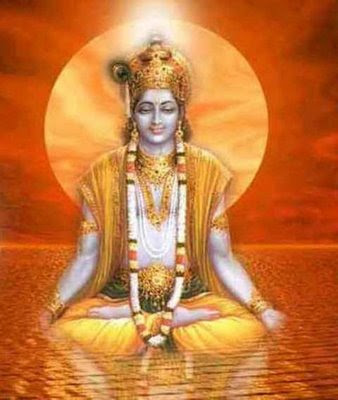The Problem
While yoga is growing at a rapid pace within the western world, its association with Hinduism is all too frequently becoming lost, disregarded and more importantly disrespected. This has been repeatedly illustrated within the corporate world through the introduction of items such as the “Hindu deity toilet seat cover” and Hindu deity shoes as well as amongst practitioners through a growing number of articles that include highly disrespectful terms toward Hindu deities and Hinduism in general. Ironically, the number of westerners chanting kirtan and bhajans is at an all time high, one would imagine that respect for Hindu deities would increase at an equal rate; sadly this does not always appear to be the case.
Recent Examples
 I recently encountered one such article at the website of Mantra Yoga + Health magazine. The article was entitled ‘Vishnu: Secret Badass Warrior’[1]. In this article, Shiva is ascribed qualities such as ‘weirdness’ and apparently having a bad attitude. Likewise the author suggests that Shiva ‘move his padamasana ass over’[2], and refers to the Goddess Lakshmi as having ‘great curves’[3], which, in my opinion, indicates a complete lack of respect for Shiva, Lakshmi and even Vishnu.
I recently encountered one such article at the website of Mantra Yoga + Health magazine. The article was entitled ‘Vishnu: Secret Badass Warrior’[1]. In this article, Shiva is ascribed qualities such as ‘weirdness’ and apparently having a bad attitude. Likewise the author suggests that Shiva ‘move his padamasana ass over’[2], and refers to the Goddess Lakshmi as having ‘great curves’[3], which, in my opinion, indicates a complete lack of respect for Shiva, Lakshmi and even Vishnu.
One might assume the author is influenced by portions of the Shiva Purana which uses sexual analogy to describe the creation of the universe, as sacred texts commonly hide their deeper meaning behind mundane analogy as opposed to simply being a graphic sexual work. A small number of texts are written this way with the understanding that study of the sacred text would reveal the deeper meaning, and it is commonly understood that one cannot read such texts with a literal interpretation.
While it is easy to place blame on one article, in reality it is merely representative of a growing problem facing Hinduism. Strangely we do not see articles by other religions authors disrespecting their deities or deity of their tradition. Yet, for some reason, anyone can write anything about a Hindu deity and it appears to be quite acceptable amongst the masses. Certainly one might argue that it is simply ignorance; yet, this is an all to common problem facing Hinduism-the ignorant expert.
It has become acceptable to use the pictures of deities for marketing purposes, to give a visual statement of how spiritual one is, in reality deities are not for marketing purposes, or something ‘cool’ to place on one’s website. This commercialism of deities increases the potential for readers to become confused as to what the deities represent, their role, and relevance they have within each practitioner’s life, and more importantly, the cosmic roles they play within creation.
 The Hindu deities represent a wide range of cosmological forces ranging from one’s own mind to the forces that shaped the universe. Hence the deities of Sanatana Dharma deserve respect, and a lack of respect indicates a lack of respect for oneself and others, in my opinion
The Hindu deities represent a wide range of cosmological forces ranging from one’s own mind to the forces that shaped the universe. Hence the deities of Sanatana Dharma deserve respect, and a lack of respect indicates a lack of respect for oneself and others, in my opinion
Sadly, it is an all too often occurrence for a teacher or student to transpose their own feelings and attitudes upon the devas, to present the deity in a form that is not really part of the tradition or teachings and in extreme cases has no connection with what the actual deity represents. Oftentimes, practitioners are not taking the time to understand that limited view hide a much deeper teaching and application of the teachings and as a result the devas are often reduced to an anthropomorphic quality akin to human emotion within the minds of students. This has even become apparent in the lower forms of tantra-sexual tantra.
Where the sexual form of tantra was intended to be an extremely spiritual event but largely intended for the lower Rajasic mind. On occasion, in some areas of the west, tantra has been reduced to little more than an orgy, or effort to legitimize prostitution under some type of a spiritual banner.[4][5] [6]Somehow in this process, some practitioners have confused sexual tantra as a lust filled purely sexual event, as if the practitioners of tantra in India are running around seeking partner after partner to engage in sexual activity with. In reality, this type of tantra is a very small representation of tantra as a whole! In my opinion, sexual tantra is one of the grayest areas within all of Hinduism and potentially an area that can be abused.
There are those that attempt to argue that somehow yoga is not part of Hinduism, that it is removed from the tradition. Yet, these critics ignore the fact that yoga is an important piece of the Shad Dharshanas that comprise an important part of Hinduism. And as such yoga comprises an integral part of Hinduism within its practice and its philosophy. The shad dharshanas are a rich system and form the spine of the Hindu tradition expanding outward through a variety of different teachings and traditions.
Are Deities in Yogic Texts
 It appears that many teachers and students of yoga do not realize that classic yoga texts themselves frequently refer to the Hindu deities. The Bhagavad Gita is considered a Yoga Shastra and is based on the teachings of Krishna-an avatar of Vishnu. Even texts such as the Shiva Samhita refers to the devas, ‘sri devyuvac’ meaning ‘shree deva speak’-5.1 Likewise, the Hatha Yoga Pradipika invokes a deva in the first words of the book- ‘Adhinatha namestu..’ salutations to Adhinatha…1.1, which is a name for Shiva. Within the same text various forms of the Hindu Goddess are referenced such as Ganga.
It appears that many teachers and students of yoga do not realize that classic yoga texts themselves frequently refer to the Hindu deities. The Bhagavad Gita is considered a Yoga Shastra and is based on the teachings of Krishna-an avatar of Vishnu. Even texts such as the Shiva Samhita refers to the devas, ‘sri devyuvac’ meaning ‘shree deva speak’-5.1 Likewise, the Hatha Yoga Pradipika invokes a deva in the first words of the book- ‘Adhinatha namestu..’ salutations to Adhinatha…1.1, which is a name for Shiva. Within the same text various forms of the Hindu Goddess are referenced such as Ganga.
Likewise, the Ida and Pingala for which Hatha is named (the sun and the moon) are referred to as a form of the Goddess. Even Sanskrit, the language these texts are written in is commonly known as ‘devavanni’ or the language of the Gods, as each Sanskrit sound is associated with a Hindu form of divinity. Even the most commonly referenced yoga text-the Yoga Sutras of Patanjali refer to Ishvara Pranidhana, surrender to divinity or lord. Within the traditions of Hinduism, generally an attitude of respect is to be given to deities, even if they are outside ones sampradaya.
The Duty of Every Hindu.
 Hindus have a duty (dharma) to stand up against the misrepresentation and misappropriation of Hinduism or Sanatana Dharma, and a duty to stand for dharma in general. The Vedas teaches and supports the concept of standing against adharma. It is clear that drifting away from dharma is a compulsion for a segment of human society. Regrettably, what appears to be ignored in the modern age is the duty to stand up for dharma. As it is quite apparent these problems have plagued Hinduism for untold millennia, the difference being in the previous ages, there have been those that stood up for dharma and embraced their sacred duty. For our current age, this concept was reintroduced by Acharya Vamadeva Shastri (David Frawley) a considerable time ago as a cal for an ‘intellectual kshatriya’ to rise up to defend Hinduism.
Hindus have a duty (dharma) to stand up against the misrepresentation and misappropriation of Hinduism or Sanatana Dharma, and a duty to stand for dharma in general. The Vedas teaches and supports the concept of standing against adharma. It is clear that drifting away from dharma is a compulsion for a segment of human society. Regrettably, what appears to be ignored in the modern age is the duty to stand up for dharma. As it is quite apparent these problems have plagued Hinduism for untold millennia, the difference being in the previous ages, there have been those that stood up for dharma and embraced their sacred duty. For our current age, this concept was reintroduced by Acharya Vamadeva Shastri (David Frawley) a considerable time ago as a cal for an ‘intellectual kshatriya’ to rise up to defend Hinduism.
But all too often the ‘intellectual Kshatriya’ has fallen into the trap of constant debate with other Hindu’s over subtleties of the tradition, yet, these same intellectuals cower away when facing opposition from someone actually disrespecting Hinduism or attempting to harm the practitioners of Hinduism. The key is in the unification of practitioners of the expansive number of different traditions joining together under the umbrella of Hinduism and standing together against the flagrant disrespect of teachings and traditions of Hinduism. It is not necessary that everyone commit to becoming an ‘intellectual kshatriya’, as all Hindu’s can simply boycott companies that belittle Hinduism. Hindus can announce their intent by writing to webpages and magazines, or post comments requesting that articles that misrepresent Hinduism be removed. There is much that Hindu’s can do that requires a minimal amount of time, yet can make a significant difference.
By Yogi Baba Prem Yogacharya, Veda Visharada
[1] http://mantramag.com/vishnu-secret-badass-warrior/
[2] Ibid.
[3] Ibid.
[4] http://www.cnn.com/2011/US/09/09/arizona.church.prostitution/index.html
[5][5] http://www.azfamily.com/news/Man-pleads-guilty-in-Phoenix-Goddess-Temple-case-162285296.html
[6][6] Note: this trial has not been resolved at this time, though it is reported through media that some have taken a plea deal.






























